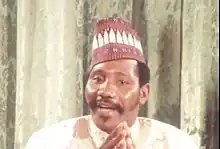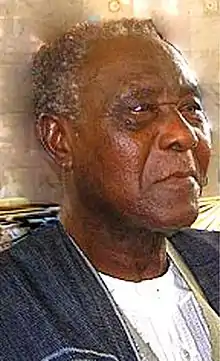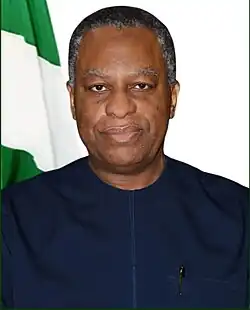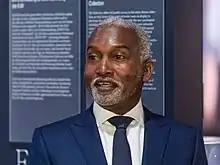 Headquarters of the ministry | |
| Agency overview | |
|---|---|
| Formed | September 1957 |
| Type | Cabinet-level executive department |
| Jurisdiction | Government of Nigeria |
| Headquarters | Tafawa Balewa House, Central Business District, Abuja |
| Minister responsible |
|
| Agency executive |
|
| Parent agency | Federal Executive Council |
| Child agency |
|
| Website | foreignaffairs.gov.ng |
The Ministry of Foreign Affairs of Nigeria is a statutory body created to reinforce foreign decision making and implementation processes in Nigeria[1] and handle the external promotion of Nigeria's domestic vision and ideals; it is headed by a federal executive cabinet minister. As of late its mission has geared towards increasing awareness about Nigeria's economic potential. It is part of the government's executive branch.
History
The ministry was created in 1961, with Prime Minister Tafawa Balewa appointing Jaja Wachuku the inaugural Minister of Foreign Affairs and Commonwealth Relations. Before Wachuku's tenure, Balewa had doubled as Foreign Affairs advocate of Nigeria, from 1960 to 1961.[2]
Structure
Departments
- Protocol
- Planning Research and Statistics
- Foreign Service Inspectorate
Parastatals
- Directorate of Technical Co-Operation in Africa
- Institute For Peace and Conflict Resolution
- Nigerian Foreign Service Academy
- Nigerians in Diaspora Commission
- Nigerian Institute of International Affairs
- Technical Aid Corps
List of ministers
| Minister | Image | Tenure | Citation |
|---|---|---|---|
| Minister for Foreign Affairs and Commonwealth Relations | |||
| Jaja Wachuku | 1961–1965 | ||
| Minister of External Affairs | |||
| Nuhu Bamalli | 1965–1966 | ||
| Federal Commissioner for External Affairs | |||
| Yakubu Gowon | .jpg.webp) |
1966–1967 | |
| Arikpo Okoi | .jpg.webp) |
1967–1975 | |
| Joseph Nanven Garba |  |
1975–1978 | |
| Henry Adefope |  |
1978–1979 | |
| Minister of External Affairs | |||
| Ishaya Audu | 1979–1983 | ||
| Emeka Anyaoku | 1983 | ||
| Ibrahim Gambari | 1984–1985 | ||
| Bolaji Akinyemi | 1985–1987 | ||
| Ike Nwachukwu | 1987–1989 | ||
| Minister of Foreign Affairs | |||
| Rilwan Lukman | 1989–1990 | ||
| Ike Nwachukwu | 1990–1993 | ||
| Matthew Mbu | 1993 | ||
| Babagana Kingibe | 1993–1995 | ||
| Tom Ikimi | 1995–1998 | ||
| Ignatius Olisemeka | 1998–1999 | ||
| Sule Lamido | 1999–2003 | ||
| Oluyemi Adeniji | 2003–2006 | ||
| Ngozi Okonjo-Iweala | 2006 | ||
| Joy Ogwu | 2006–2007 | ||
| Ojo Maduekwe | 2007–2010 | ||
| Martin Ihoeghian Uhomoibhi (Supervising) | 2010 | ||
| Henry Odein Ajumogobia | 2010–2011 | ||
| Olugbenga Ashiru | 2011–2013 | ||
| Viola Onwuliri (Supervising) | 2013–2014 | ||
| Aminu Bashir Wali | 2014–2015 | [3] | |
| Geoffrey Onyeama |  |
2015–2023 | [4] |
| Yusuf Tuggar |  |
2023–present | [5] |
References
- ↑ Mimiko, N. O., & Mbada, K. A. (2014). Elite Perceptions and Nigeria's Foreign Policy Process. Alternatives: Turkish Journal of International Relations, 13(3), 41-54
- ↑ "Our History – Ministry of Foreign Affairs, Nigeria". Retrieved 2023-12-04.
- ↑ New Foreign minister Archived 2014-04-13 at the Wayback Machine
- ↑ "The Honourable Minister of Foreign Affairs Mr. Geoffrey Onyeama". Ministry of Foreign Affairs of Nigeria. Archived from the original on 2016-08-12. Retrieved 10 February 2016.
- ↑ Abdallah, Nuruddeen (August 21, 2023). "Tuggar pledges to unveil new foreign policy on nation's development". 21st Century Chronicle.
External links
This article is issued from Wikipedia. The text is licensed under Creative Commons - Attribution - Sharealike. Additional terms may apply for the media files.
